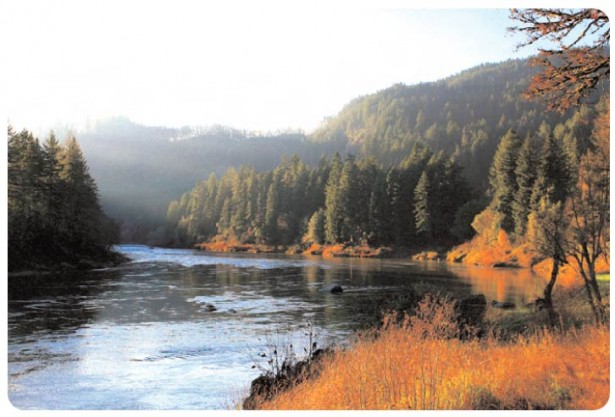
Listening to tales of the numbers of fish that can be caught in
Oregon’s 111-mile-long Umpqua River brings to mind the old adage
that goes something like, “All fishermen are liars except
you and me — and I’m not so sure about you.”
Depending on time of year, salmon and steelhead are big draws for anglers who not only want to fish, but to actually catch, the large and feisty variety. While not as large — but equally feisty in their weight class — the southern fork of the river contains uncounted numbers of bronzebacks, smallmouth bass, non-natives to those waters. Old fishing journals refer to smallmouth bass, one of the larger members of the sunfish family, as “ounce-for-ounce and pound-for-pound, the gamest fish that swims.”
Expert angler/author A.J. McClane in his Game Fish of North America treatise calls smallies “one of the most important gamefish found in North America” and notes that American Indians, specifically Algonquin Indians, had a special name for this species — achigan or “ferocious.” McClane cites fellow fisherman and scribe Zane Grey with a now 100-year-old quote about river bass, widely acclaimed as the top trophy of the bass family: “These black and bronze fellows are the most beautiful and gamy fish that swim.”
Sleek and stream-lined, smallmouth (Micropterus dolomieu if you insist) are willing to chase down their prey and anglers emulate bass forage with a wide range of natural and artificial baits and lures. While it’s a challenge to find a lure that won’t draw a hit — everything from spoons and spinnerbaits to topwater and/or diving plugs — a 4” worm on a 1/16th jig head is among the more popular methods of attracting interest.
Males of the species range around two pounds while females are larger, three to six pounds. The current smallmouth world record of 11 pounds 15 ounces is now nearly 60 years old.
“If you only catch 50 on a 3-hour float-thru of the River Loop section — 18 miles of bass heaven and a Holy Grail for bass addicts — it’s a slow day,” says Wayne Shammel, General Counsel for the Cow Creek Band of Umpqua Tribe of Indians. “When fishing is really hot, it’s insane, and 100 smallies can be boated per day with several 5-pounders common.”
Non-native fishing guide Todd Harrington and a boatload of Big K Guest Ranch clients once reportedly caught and released 600 smallmouth in a single day on the river. It’s unknown who counted them or how, but it’s been estimated there are 4,000 smallmouth bass per river mile.
“For hundreds of centuries, Native peoples have lived here — explored, hunted, gathered, and fished,” according to TravelOregon.com. “The rivers, lakes and estuaries were first navigated in dug-out canoes and these ridges and valleys have always been our home.”
While there is no tribal sustenance fishing on the Umpqua, Cow Creek members are recognizing sport fishing (and elk hunting) as indirect money makers. “We’ve got a great resort [Seven Feathers Casino Resort] to go with the natural beauty and the tribe is committed to a total area destination,” says Shammel.
Tribal Chairman Dan Courtney admits he’s not a big fisherman so he doesn’t have any fishing adventures to share. But he adds: “For me, getting out on the river with a fishing pole in hand is more about the whole experience of the river and the country surrounding it. It’s relaxing and the perfect escape, and if I catch a fish — that’s a bonus.”
All interviewees concurred that while angling opportunities may be the icing on the cake, the overwhelming natural beauty of the area is the main visitor magnet. “The Umpqua River sells itself. It’s a marvel of nature and an unbelievable stretch of beauty mile after mile,” says tribal staff member Susan Ferris.
“The Umpqua, with the South fork flowing from the heart of Cow Creek country, is the grand jewel of all,” says tribal chairman Courtney. “Experiencing either fork of the river in any season is magical. Cow Creek country is a must for travelers, especially if they appreciate nature (and the potential of boating a bagful of bass as a bonus).”
© 1998 - 2012 Indian Country Today. All Rights Reserved To subscribe or visit go to: http://www.indiancountry.com